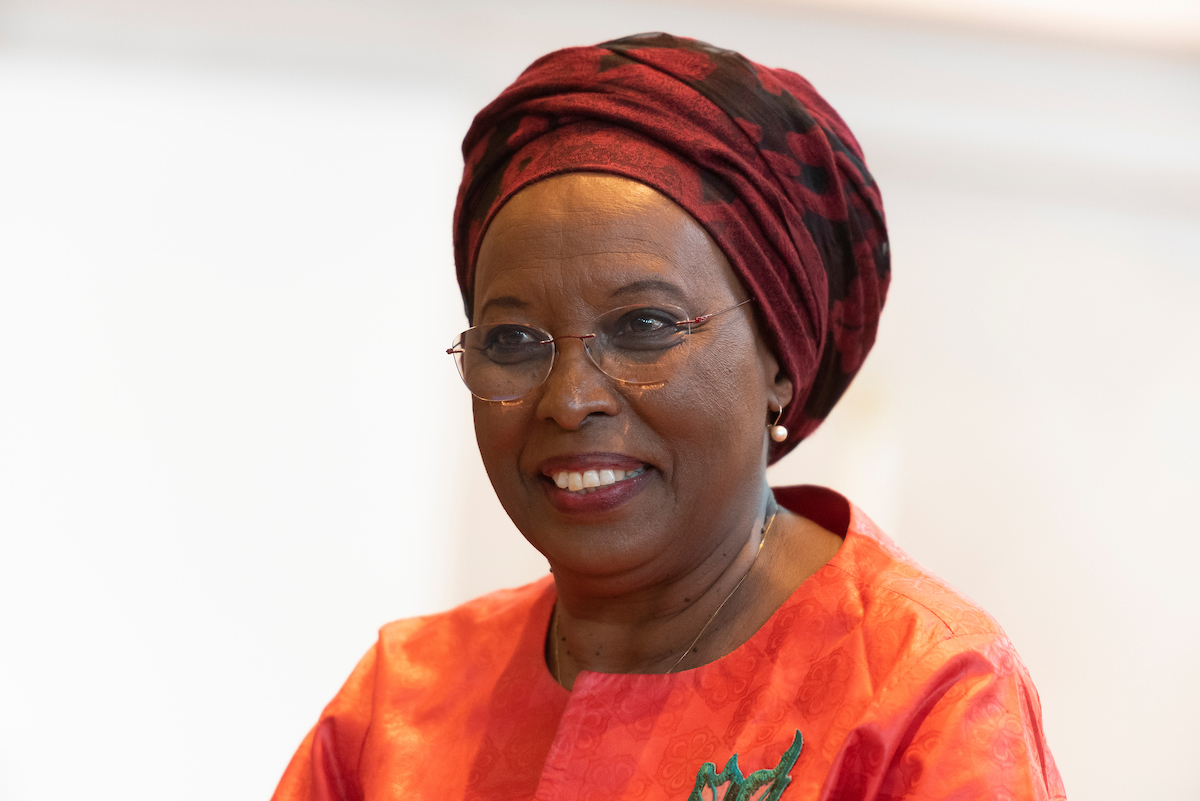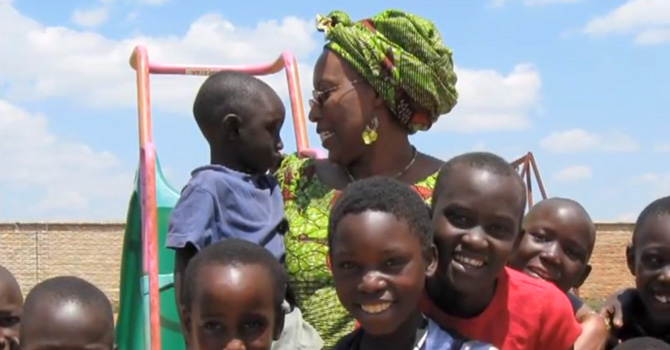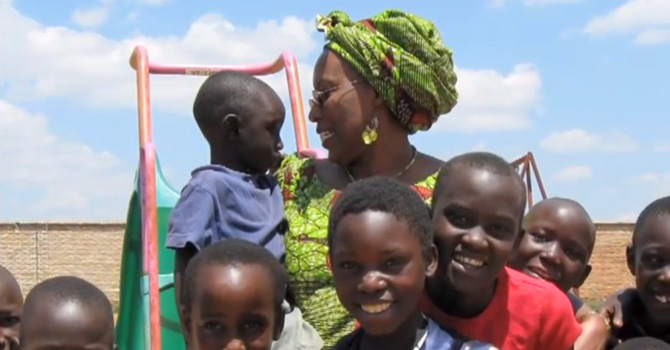Editor's note: This interview contains references to sexual violence and graphic descriptions of violence.
For 22 years, Marguerite “Maggy” Barankitse had worked to build a set of institutions in Burundi to help citizens of her native country recover from the Burundian civil war.
Her organization, called Maison Shalom (House of Peace), grew to include schools, homes, a hospital, a morgue, a movie theater and even a swimming pool — a gesture toward baptism on a former killing field.
In 2015, she lost it all.
After criticizing then-president Pierre Nkurunziza, Barankitse went from being the “Mother of Burundi” to persona non grata. She escaped to nearby Rwanda as a refugee — or, as she prefers, a citizen of the world.
“I don’t think that there is anybody in the world who has seen so many atrocities and so much generosity,” she said.
“My life is always to go and to explain and to transform all those lives, to give them hope.”
The work of Maison Shalom took root on Oct. 24, 1993, when ethnic violence escalated between Hutu and Tutsi factions following the assassination of Burundi’s president, Melchior Ndadaye. A gang of Tutsis came to the bishop’s house where a group of people, including Barankitse, had sought refuge.
Barankitse was beaten, stripped, tied up and forced to watch as more than 70 people were murdered. Yet Barankitse was allowed to live, because she shared the killers’ ethnic identity.
After the attack, she gathered her seven adopted children and others, determined to raise a new generation dedicated to forgiveness and peace. The community she built, Maison Shalom, was one of the few places in Burundi where Hutus and Tutsis (and members of other groups) lived together.
She continues that work now in Rwanda, which hosts more than 125,000 refugees, most of whom live in camps. Some of those were children at Maison Shalom in Burundi. Although the situation is different in Rwanda, Barankitse’s message remains the same: all people are children of God and deserve to be treated with dignity.
Barankitse, who gave the 2022 Catena Lecture at Duke Divinity School, spoke with Faith & Leadership’s Sally Hicks about how things have changed since 2015 and how people can support her work. The following is an edited transcript.
Faith & Leadership: We last spoke to you in 2013. What is your life like now?
Maggy Barankitse: Of course, my life changed completely. I don’t have a passport. I am on international protection. I have a travel document from Luxembourg. The work, it is tough because the refugees need more than what I have. Economically, I must ask more of my friends.
I live in Kigali, but I must travel often from Kigali to reach the Mahama camp, where the Burundian refugees are. It’s four hours. But I must go.
And among those refugees, it’s not like in Burundi, where it was a normal life. Among those refugees, there are some who were tortured, raped — and the very strange thing that the ruling party in Burundi did, even to castrate young people.
Imagine to see all those suffering and not to be able to console them. Because how can you explain to young people who were castrated to rebuild their lives? And how can you explain to a mother, a young mother who was raped in front of her mom, in front of her child, in front of her husband, to rebuild [from] all the humiliation and trauma?
Sometimes, I feel tired to see all those things and to explain to all those big [aid] organizations that we are normal people, normal human beings. That they must not also humiliate us, in giving stupid things.
But, however, I am a Christian. I believe that if he gives me all those crosses, he gives me also friends like Simon. And I have many friends. I have many friends who understand me, who understand our sufferings.
And I continue to [plant] seeds. I carry [the people] in my heart. I pray. I pray — sometimes I make my lament. I go in chapel, for example, and cry. I need to cry also. I need to mourn all those suffering, because all the refugees think that I am a very powerful woman, and they come, they want me to listen to them.
Then I must also stop, have a break and go to offer all that suffering to our Lord, who asks us, “Don’t be afraid. Come, all the people, you are very tired. I will give you enough grace to be able, yes, to carry that. Yes.”
F&L: In Burundi, your work began with saving children, and you ended up building a whole city, really. What is your work now?
MB: I think that many people don’t understand; they think I focused on children. No, I focus on the communities, the origins, the roots of those children. There is a big difference to focus on children, to take care only of the children, [or] to try to work in a holistic way, to say, “Why did this child become an orphan?”
I focus on [trying to prevent] children being recruited to become child soldiers. Then I work with politicians to explain [why] children accept a weapon. Why? Because they were hungry, because they can’t go to school, because the family was poor. They have nothing to lose, then they go.
How to change this community to give them hope? I try to involve all the poorest of families to give them loans. And I created the microcredit bank.
In Burundi, I created a hospital, because I was thinking, “Why do children lose their parents at birth?” Because the mothers have no medical care. Then I created the mother and child centers to prevent all those diseases. And also nutrition and everything a mother needs when she’s pregnant.
F&L: Are you in touch with the many children who grew up in Burundi with you? You seem like a proud mom.
MB: Yes, I am. I can show you, for example. [Shows cellphone with 245 unread messages.] They say, “Mom, we love you”; “Mom, we listen to you”; “Mom, you are an extraordinary mom.” I celebrate, every day, their lives.
I am the happiest mom in the world. I don’t know how to thank God. He blessed me. I don’t know why God has chosen me.
F&L: And now you are working with refugees in Rwanda?
MB: I don’t like this word “refugee.” Now I say “a citizen of the world.”
Because of my background, knowing what the people need — to keep their dignity — this is what I am doing. And I don’t [just] focus on refugees but also the host community, because I want to build a society where we will not have refugees because of war.
Normally, in other countries, refugees wait for help from the U.N. agency for refugees. But I said, “We are normal people.” And then, “We will ourselves propose to you what we want to do. We have talent.”
And you can see that we transformed the refugee camp. We refuse to have tents. Now we build and we plant and we cultivate around the houses some vegetables. We plant trees. The children you see, we send them to school.
We believe in this dignity that God gave us. And this is how we try to continue to work. Now Maison Shalom can be run by the former children of Maison Shalom.
I created a foundation in my name, the Maggy Barankitse Foundation. Why? Because of this universal message of love to build a new world in a new generation who will be able to show that we are one humanity. I travel to share this message.
F&L: The help you need, is it primarily financial support, or do you want more people helping in Rwanda?
MB: Financial. My mother, Tereza — she always forbids me to ask for money. But now it’s for humanity that I am able to say, “Please, you listen to me, you think I am an amazing woman, but you are also amazing. You can contribute to help all those people.”
I am the voice for all those voiceless in Great Lakes region who have nothing and who are in the refugee camp.
People admire me, but I want also people to help, because I’m older now. They can ask me how to help, how to help Maison Shalom, how to help me to realize all those dreams.
For example, yesterday a family called me. It was very early. They were thinking that I am in Rwanda. [They told me their] children passed three days without eating; the children can’t go to school.
Immediately, I called the staff of Maison Shalom: “Please go and visit and see what we can do.” But it’s too much.
F&L: How do you keep going after all the trauma you’ve experienced? You tell these horrific stories, and yet you seem joyful.
MB: It’s because of my childhood. I was raised by a special mother. I remember when my father died. I was very young, around 6. And my mother, when I was crying, also she cried, but she said, “My child, don’t forget that a Christian is never a widow. Never a widow. Your father, Michael, he will provide what we need. Then we don’t lose him. You must see it with heart. He will be there.”
And I grew up in this atmosphere: thanks and gratitude. Always, every day, we go to Mass. And I remember when suffering came, death or disease, she was there to give me tenderness and to explain that life still is always a feast. We sing too much; we dance too much. I grew up with this.
When trauma arrives, I always think that I am not alone. It’s because of this faith, in life, in God also, but also in all the generosities that I received. I carry all those things.
And when I think about, for example, the 24th of October — the same day, a German young man risked his life to protect us, to give us his house, knowing that they might kill him.
Then I think I must continue this, to spread this love and to show in the same moment, when hatred came, there is love, which takes the last word.
I feel loved. And I want also to make this gratitude into action: how can I give back? I will never, for example, give back all this love I got from my mom.
She answered my grandfather one day, because my grandfather came to our home and said, “Tereza, please, don’t worry. If you want to remarry, you can go. We will raise your two children with love. You are very young.”
And she looked at my grandfather, “I am still married to your son. I am the wife. And he’s there.”
How a simple woman who didn’t go to school — but I say that my mom was a Ph.D. in philosophy, in theology. She always had a response to all questions. And I want to give back, to say, “Mom, when you were here, I didn’t recognize what an amazing mother you were.”
I want to be an amazing mother now and give this legacy through the Maggy Barankitse Foundation. To go to the extremity of the world to spread this love from God — that we are children of God, princes and princesses. This is what I want for the world.















